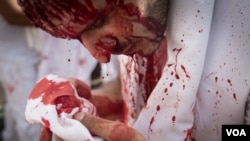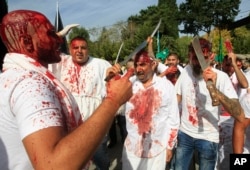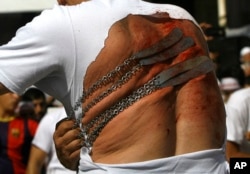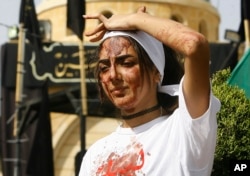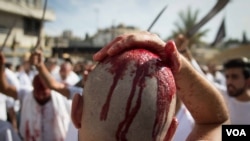As streams of blood trickled down the streets of the southern Lebanese town of Nabatieh, Shi'ite muslims commemorating the holy day of Ashura gathered to reflect on the roots of their faith.
Across the world, millions of Shi'ites on Wednesday honored the Prophet Muhammad's grandson Hussein, whose death in battle in 680 marked a schism in Islam that has persisted to this day.
Likewise, believers across Lebanon took to the streets, dressed in black as a sign of mourning.
Numbers were highest in the southern suburbs of Beirut, where entire neighborhoods became a backdrop to the occasion and roads across the southern part of the city were closed down.
In Nabatieh, however, thanks to a ritual of bloodletting largely shunned elsewhere, the scene was very different.
A precious thing
Showing telltale scars, Ali Saeed, 35, explained the practice of tatbir, in which participants strike themselves over the forehead with a knife.
"Blood is a precious thing to a human being, but it must leave our bodies in protest against those who hate the justice of God," he said.
He spoke from the courtyard of a mosque in the center of Nabatieh, where groups of men mingled with young boys participating in a ritual that is unusual in Lebanon and remains a practice undertaken only by a small minority of Shi'ite elsewhere in the world.
Beyond them, others marched in processions performing the same ritual, while medical teams waited to stanch wounds and assist the few who had fainted.
Tatbir is disputed among Shi'ite clerics and disapproved of by Hezbollah, the Iran-backed group with strong political and military clout within Lebanon.
The ritual, however, persists in Nabatieh, often among followers of the Amal Movement, another Shi'ite political group within the country.
Saeed was careful to state that, despite the act of self-harm, for him Ashura was about opposing violence and injustice in the world.
"Why does brother kill brother?" he asked.
Even in Nabatieh, not everybody approves.
"These are just a small minority of people, and we are not with them," Ali Diab, 24, said of those who engage in tatbir, adding it "gives a bad image" of Shi'ite Islam to the rest of the world.
Despite disagreements about how best to mark Ashura, many spoke in unity about the contemporary resonance of the day in a country where religious division is all too present.
A target for attacks
Security is tight around commemorations within Nabatieh, as it is in Beirut and elsewhere in Lebanon.
Ashura marks the death of Hussein in the battle of Karbala after his refusal to pledge allegiance to Caliph Yezid — a dispute that helped cleave a divide between Sunnis, who are thought to make up about 85 percent of the world's Muslims, and Shi'ites.
At least 14 people were killed Tuesday after an attack on those gathering at a Shi'ite shrine in Kabul, Afghanistan, the latest in a long line of attacks on those marking the day.
Meanwhile, the Islamic State group — which labels Shi'ites apostates and targets them — remains a threatening force in neighboring Syria.
In a second rare public appearance in Beirut over consecutive days, as part of a wide-ranging speech, Hezbollah leader Hassan Nasrallah said his group would continue to intervene militarily in Syria in support of the country's president, Bashar al-Assad, something it has done since 2013.
It is a move that has polarized the nation but enjoys strong support among many in Lebanon's Shi'ites community.
"Even now, history is coming back," said Diab, drawing parallels between the killing of Hussein and the violence inflicted on Shi'ites Muslims and others by Islamic State. "In Syria, they are killing people in a bad way, and we are against terrorists."
Internal power
Although blood, often accompanied by the chant of "Haidar, Haidar" — a term referring to the nickname of Hussein's father, Ali — is impossible to miss in Nabatieh, the town's commemoration shares rituals more commonly seen elsewhere during Ashura.
Families gather as eulogies are recited and the battle of Karbala is re-enacted with elaborate costumes and riders on horseback.
Meanwhile, free food and drinks are handed out to those present.
For Ahmad Jammoum, 23, the day was one not just of sadness, but of pride and unity for Shi'ites Muslims across the world.
"If it was not for Imam Hussein, Shi'ites would not exist," Jammoum told VOA.
"We continue to face oppression around the world, but he gave us an internal power," he said, adding, "It means everything to us to be here today."
IN PHOTOS: Shi'ite Muslims Commemorate Ashura in Nabatieh




